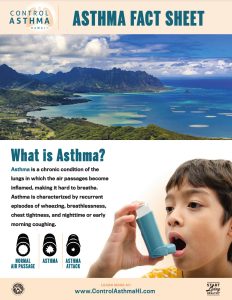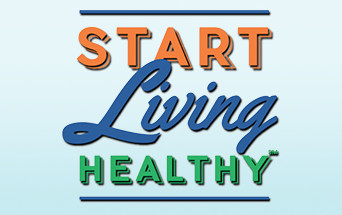Asthma Signs, Symptoms & Triggers
Asthma can affect anyone but most often occurs in childhood. Asthma is characterized by recurrent episodes of wheezing, breathlessness, chest tightness, and nighttime or early morning coughing. Complications from asthma can be minor to life-threatening. Therefore, it is important to manage your asthma and monitor children with asthma.
What are the Signs and Symptoms of Asthma?
There are simple actions people can take to have asthma diagnosed, treated, and controlled. Remember: you can control your asthma.
Symptoms of asthma may include:
- Chest tightness
- Coughing (especially at night or early morning)
- Shortness of breath
- Wheezing (which is a whistling sound when you breathe out)
Other conditions can cause asthma symptoms. These symptoms often follow a pattern:
- They come and go over time or within the same day
- They start or get worse with viral infections, such as a cold
- They are triggered by exercise, allergies, cold air, or breath
 ing too fast from laughing or crying
ing too fast from laughing or crying - They are worse at night or in the morning
For more information, download the DOH Control Asthma Hawaii fact sheet and the What is Asthma? fact sheet.
What Causes an Asthma Attack?
Asthma triggers within the home, workplace, and outdoors can set off or make asthma symptoms worse. Common asthma triggers include:
- Indoor allergens, such as dust mites, cockroaches and other pests, mold, and pet dander or fur
- Outdoor allergens, such as pollens and mold
- Emotional stress, such as intense anger, crying, or laughing
- Physical activity, however it is important to stay active, so talk to your doctor about it
- Respiratory infections, such as colds, influenza (flu), or COVID-19
- Certain medicines, such as aspirin, which may cause serious breathing problems in people with severe asthma
- Tobacco and vape smoke (secondhand smoke), outdoor air quality (including factories, cars, or wildfire smoke), bad weather, and volcanic smog (VOG)
For more information, visit Control Asthma Hawaii, CDC Common Asthma Triggers, and NIH NHLBI: Asthma.
It is important to follow your doctor’s advice, know the warning signs of an asthma attack, be aware of your triggers, and learn how to avoid those triggers that can cause an attack. Although asthma cannot be cured, most people can control asthma so that they have fewer symptoms and can live healthy, active lives. Take control of your asthma by visiting the What You Can Do tab.
Sources:
CDC Common Asthma Triggers. Accessed April 2022.
NIH NHLBI: Asthma. Accessed April 2022.



